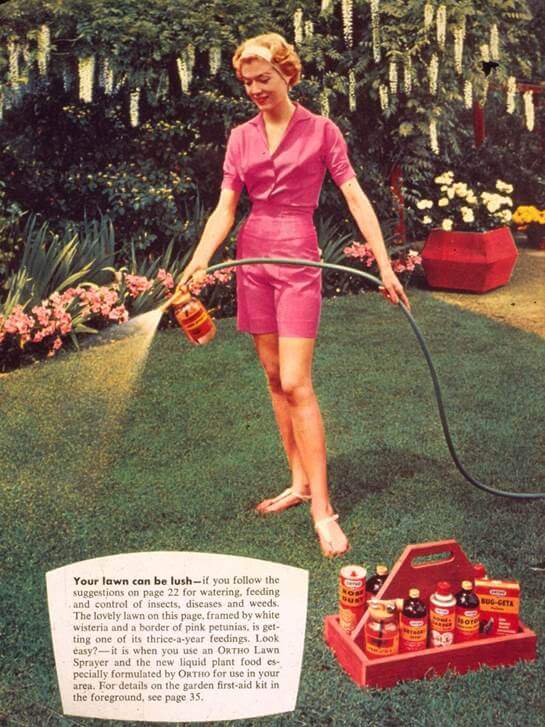
Attitudes and behavior related to pesticide use have evolved from when we started In Harmony 25 years ago.
[Ed. note: In honor of our 25th anniversary, this is the first of several blog posts about changes we have seen in landscape practices over time.]
When we started In Harmony 25 years ago, the landscape industry had a very different mindset. The strategy for maintaining landscapes depended on regular use of pesticides and chemical fertilizers. It was “better living through chemistry.”
We wanted to do things in a different way, to have a business that focused on creating healthy landscapes. If plants were healthy, they wouldn’t depend on pesticides and chemical fertilizers. If we weren’t using chemicals on the job, we would be healthier, and our clients could breathe easier. And we wouldn’t release all those chemicals into the soil, air and water.
Many people in the landscape industry scoffed at us. They thought we couldn’t succeed without relying on chemicals. We persevered, and slowly built our business.
Local governments take action
Local governments recognized our efforts. We were one of the first five-star EnviroStars, a program that certifies businesses for reducing or eliminating the use of hazardous products.
Meanwhile, in the 1990s local governments in the area began efforts to encourage people to reduce pesticide use. They worked to get media attention about pesticides in local streams. A group of local governments created the Natural Lawn Care Program, which reached large numbers of people to encourage them to reduce the use of pesticides, chemical fertilizers and water. They later expanded into the entire landscape, creating the Natural Yard Care Program.
Surveys found that after several years of these programs, people said they were less likely to use weed and feed or other pesticide products and more interested in hiring a landscaper that used environmentally friendly methods.
For example, Snohomish County held a series of workshops to teach people about natural yard practices. They found that after people attended the workshops, reported use of weed and feed decreased by 53 percent.
People are buying more organic food
There has also been an increasing demand for organic food. According to the Economic Research Service, retail sales of organic foods more than doubled from 1994 to 2014, with a 10% annual growth rate. The researchers found that 73% of Americans said they had bought locally grown fruits and vegetables in the past month.
Many people turn to organic food because of health concerns. “More than half (55%) of the public says that organic fruits and vegetables are better for one’s health than conventionally grown produce.”
The landscape industry gradually moves to a more natural approach
As time went on, we met others in the landscape industry who were taking a more natural approach. After we had been in business for several years, the director of the Washington Association of Landscape Professionals began using the organization’s magazine to encourage greener methods.
A major pesticide distributor was unhappy with those actions and threatened to pull its advertising. Eventually the same pesticide distributor saw the trend and became a major supplier of organic products for the landscape industry.
In recent years the landscape industry has responded to public concern about pesticides by moving toward more environmentally friendly approaches. According to American Landscape and Lawn Science, the top three lawn care trends for 2017 were the use of more organic lawn fertilizer and less synthetic fertilizer, efficient watering practices and less pesticide use.
In Harmony’s approach continues to evolve
Many people call In Harmony because they don’t want to use pesticides on their landscape. While our primary focus is on building the health of soil and plants, we occasionally use pesticides in small, targeted doses.
For example, some people would like organic lawn care but can’t stand weeds in the lawn. For those clients, we provide all of our regular natural lawn services to build lawn health. Then we spot spray the weeds that are still present.
We continue to learn and revise our approach. For example, we were doing Pointer injections for insects in birch trees. We found out the insecticide was harmful to bees, so we stopped doing them. It was a loss of revenue, but it was the right thing to do.
Find out more about In Harmony’s approach to lawn, tree and shrub care.
